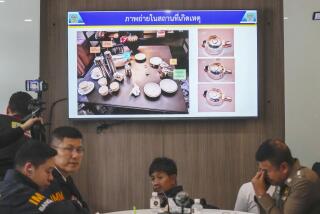Bangkok death toll hits 24 as troops fire live rounds, seek to isolate protesters
Reporting from Bangkok, Thailand, and New Delhi — Thailand’s army declared a glitzy shopping district in the center of Bangkok a “live firing zone” Saturday as the death toll rose to 24 on the third day of a bloody standoff between troops and anti-government protesters.
Taking cover behind sandbags and on rooftops, troops fired live rounds in a bid to contain the demonstrators, who have demanded that Prime Minister Abhisit Vejjajiva resign, call immediate elections and leave the country.
The “Red Shirt” protesters faced the troops down, erecting barriers of tires and bamboo sticks and wielding gas bombs, stones, guns and homemade rockets as they vowed to maintain their two-month siege. Since the latest flare-up began Thursday, 198 people have been injured.
In a televised broadcast Saturday evening on all Thai channels, Abhisit accused a small group in the protest movement of trying to foment civil war.
Alleging that some in the protest camp had launched M-79 grenades against troops, he repeated a call for protesters, most of them from farming or working-class communities, to return home.
Government crisis managers are concerned that unrest will spread beyond Bangkok, as seen by last week’s extension of emergency rule to 17 of Thailand’s 76 provinces.
“The real danger in the months to come is of either a bungled crackdown in Bangkok or a military takeover,” analyst Anthony Davis wrote in the security publication Jane’s Intelligence Review. “Either of these scenarios could well provoke a backlash of Red Shirt guerrilla attacks across wide swaths of the north and northeast of the country.”
The crisis has paralyzed parts of Bangkok, closing the capital’s sky train, embassies and downtown businesses, hurting the region’s second-largest economy and scaring off the vital tourist trade in one of Asia’s most promising emerging markets.
With the crisis showing no signs of abating, the U.S. State Department issued a statement Saturday warning U.S. citizens to “defer all travel to Bangkok and defer all nonessential travel to the rest of Thailand.”
The army has tried to surround the mile-square area that several thousand protesters have refused to vacate, setting up razor-wire checkpoints to prevent more people from entering.
But demonstrators in the Ratchaprasong district were defiant.
Protesters are “not afraid of guns,” said Jaran Ditapichai, a Red Shirt protest leader speaking near a stage and a table of Buddha figurines, adding that the recent crackdown has only strengthened their resolve.
“Even in the last three days, they are not afraid,” he said. “If they were afraid, they would have gone back home already.”
Power, water and cellphone service were cut recently to the besieged area, leaving the masses scrambling for generators, food and bottled water. Protesters said the government also stopped collecting the garbage. In the besieged neighborhood, trash bags bulged with cartons and rotting food as people a few yards away napped in the hot afternoon sun.
Any plan the army has of storming the area has been complicated by the layout, a desire to appear measured and the presence of women and children. Abhisit said Saturday that the military would help women and children leave the protest area.
“People are saying the protesters have had ample time to leave,” said David Tuck, research director in Bangkok with Spectrum OSO Asia, a risk analysis firm. “But no prime minister wants to have blood on his hands.”
Despite the army’s warnings that the area was now a live fire zone, the mood Saturday was festive, as coconut juice and pineapple slice vendors served a steady stream of customers.
Periodically, an army helicopter flew over, prompting protesters to light firecrackers and throw rocks. As smoke erupted from homemade rockets, protesters would cheer.
Red Shirts contend that Abhisit’s coalition government came to power by manipulating the courts and with the backing of the powerful military.
Thaksin Shinawatra, a former populist prime minister, enjoys broad support among the Red Shirts. After he was forced from office by the military in a 2006 coup amid corruption allegations, two pro-Thaksin governments were disbanded by court rulings before Abhisit became prime minister.
A resident of a nearby condominium who would identify himself only as Witan B., a Foreign Ministry employee, said he was fed up with the protests but acknowledged that the Red Shirts have raised valid concerns over corruption and inequality.
“We know what the problem is,” he said. “But these protests are not the right way.”
Thailand is no stranger to political unrest, having seen 18 constitutions, 27 prime ministers and a spate of violent demonstrations since the start of the constitutional monarchy in 1932.
Abhisit recently offered to hold elections in November as part of a “reconciliation plan,” but Red Shirt leaders immediately upped their demands and talks fell apart.
“The problem is that after the reconciliation plan, Abhisit has no Plan B,” said Michael Montesano, visiting research fellow with the National University of Singapore’s Institute of Southeast Asian Studies.
Times staff writers Tran reported from Bangkok and Magnier from New Delhi.
More to Read
Sign up for Essential California
The most important California stories and recommendations in your inbox every morning.
You may occasionally receive promotional content from the Los Angeles Times.










